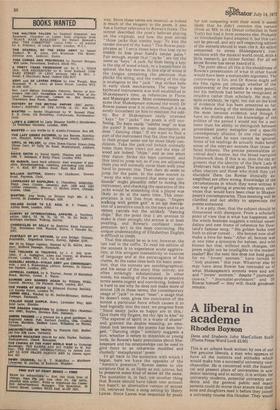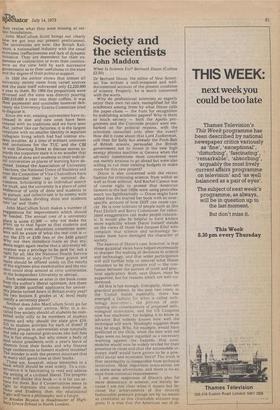A liberal in academe
Rhodes Boyson
Dons and Students John MacCullum Scoit (Plume Press/Ward Lock 0.60)
This is an urbane book written by one of our few genuine liberals, a man who appears to have all the instincts and attitudes which would make him a successful university vicechancellor. He is concerned with the historical and present place of universities in academic learning and in society. It is written for university students, potential university students and the general public and many parents could do worse than ensure that their sons and daughters read it before they joined a university course this October. They would
then realise what they were missing at certain foundations.
John MacCullum Scott brings out clearly how we got into our present predicament. The universities are now, like British Rail ways, a nationalised industry with the usual economic ineffectiveness and lack of dynamic initiative. They are dependent for their expansion or contraction or even their continuance on the view held by each successive government as to their usefulness to the state and the degree of their political support.
In 1939 the author shows that almost all university money came from varied sources and the state itself subvented only £2,220,000 a year to them. By 1969 the proportions were reversed and the state was directly pouring £200,310,000 a year into their coffers. It was their paymaster and controller however delicately the University Grants Committee tried to disguise it.
Since the war, existing universities have increased in size and new ones have been created with no traditions and we have seen that, rather like car factories, it is the largest creations with no smaller identity in separate collegiate living which had had intense stu dent troubles. At a time of militant unionism and invitations for the TUC and the CBI to visit Downing Street to discuss moves to wards the corporate state it is no wonder that loyalties of dons and students to their individ ual universities as places of learning have de clined. Instead the Association of University Teachers, the National Union of Students and even the Committee of Vice-Chancellors have all demanded their say in national discUssions. Scholarship is an individual search for truth, and the university is a place of joint endeavour of units of dons and students in its pursuit, and collectivism is its enemy with national bodies dividing dons and students into 'us' and 'them.'
John MacCullum Scott makes a number, of suggestions for improvement which should be heeded. The annual cost of a university Place is some £1,500 — why not make the grant up to that figure so that students and Public and even education committee mem bers will be aware of what the real cost is — not the £75 or £100 fees or the £450 grant? Why not then introduce loans so that stu dents might again realise that a university education was a privilege to be paid for, not a right for all, like the National Health Service °r pensions at sixty-five? These grants and loans should be offered solely on the results of the eighteen-plus examination and the student could shop around at civic universities, at the Independent University or abroad. Such weaknesses as arise in the book come froth the author's liberal optimism. Are there really 20,000 qualified applicants for univertY places turned down in Britain every year? !Jo two bottom E grades at 'A' level really Justify a university place? Neither does John MacCullum Scott go far enough on students' unions. Why in a so called free society should all students be com Pelled willy nilly to be members of student Unions and why should the state give £10 £15 to student activists for each of them? If student groups in universities arise naturally and take up national grievances like hall fees this is fair enough, but why create a body of Paid union presidents with a year's leave of absence from their books and why finance huge conferences to foment student troubles? The wonder is with the present structure that So many still spend time at their books.
, These are however, minor blemishes in a eek h.
w ich should be read widely. To a con.
servative it is fascinating to read and admire the writing of a civilised liberal. The progres !Ives will dislike this book — it is far too uroen
e for them. But if Conservatives mean to
;Ight to maintain the values enshrined in ,47,19ns and Students then the educational rtr,ight will have a philosophy and a future. ?r' Rhodes Boyson is Headmaster of High"LirY Grove School in North London.































 Previous page
Previous page